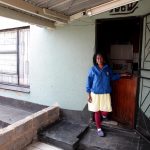Temporary court victory for beleaguered Vusimuzi residents
A reblocking initiative in Tembisa has left a number of residents in the cold. But, despite winning an interdict against the development process, shack dwellers remain vulnerable.
Author:
2 July 2019

A group of residents opposed to reblocking in Vusimuzi in Tembisa in Ekurhuleni, held a shutdown on the nippy morning of 1 July, culminating in a standoff with members of a committee who are in favour of reblocking and have been hired to carry out municipal contracts.
Advocates of reblocking claim that it will make shack settlements safer and easier to manage by constructing a system of roads to allow vehicle access into settlements. This, it is said, will enable the roll out of services within the settlements as well as access by emergency services.
Officials claim that the process causes minimal disruption to residents, who will benefit afterwards. But its application in some places has been described as authoritarian. Some people have lost their homes, others have had parts of theirs homes destroyed, or have been moved right next to former pit latrines. Schooling and work has been disrupted.
Related article:
This has prompted some residents to organise against reblocking and resulted in serious conflict with the local state, as well as bitter divisions within communities.
In some cases, people who have rejected the reblocking project allege that they have been threatened and intimidated by the police, Ekurhuleni metro police and the Red Ants.
The strike on 1 July followed the City of Ekurhuleni making a note to appeal against an interim court ruling stopping the City from carrying out the process of reblocking in Tembisa. This, after an urgent application brought by the Socio-Economic Rights Institute (Seri) on behalf of Abahlali baseMjondolo and a ruling handed down at the South Gauteng High Court in Johannesburg by acting Judge Brad Wanless on 28 June.
Wanless postponed the case to 6 July pending finalisation of applications and counter applications, reserving the costs for the decision of the court.
Pending that date, he granted Abahlali baseMjondolo interim relief by ruling that the reblocking process could not continue to be carried out in the 24-year-old settlement.
Brutal evictions
Many agreed to have reblocking rolled out in Vusimuzi following consultations in November 2017 in which residents were allegedly promised electricity in exchange for agreeing to reblocking. In early January 2018, some residents changed their minds when they were put out of their homes without alternative accommodation. Many watched as their dwellings of 20 years were demolished while the process was implemented.
On 27 June, there was a hopeful spirit in the air among aggrieved Vusimuzi residents who filled up the gallery in courtroom 9F while others sat on the floor. A section of the residents had already had some or all of their homes destroyed by workers from the City. Other court attendees came from different parts of Tembisa such as Tswelopele or from areas where reblocking has not yet been introduced.
During the court hearing, the City’s advocate Emmanuel Sithole accused Seri of abusing a busy court with a case based on “ulterior motives” and “self-made urgency”. Seri’s attorney Thulani Nkosi argued that the case was urgent and serious as Abahlali baseMjondolo wanted to stop “what they view as ongoing harm”.
Although Sithole tried to argue that reblocking and realigning is not demolition, Nkosi said that no matter what one wanted to call it, it resulted in the destruction and demolition of structures and homes, which hurt people, including children. Nkosi argued that the rough implementation of the reblocking process was nothing short of a “forced removal”.
“They built these structures with their own hard labour and some have been there for over 20 years,” he argued.
Lies in court
After the ruling on 28 June, the City asked for leave to appeal. A number of residents expressed disappointment in the “lies” they heard in court from people who testified in favour of reblocking, including resident Joseph Sithole.
Nokwazi Mbatha, 48, told New Frame her bedroom wall, which was demolished at the end of May, is still standing agape, exposing her and her family to the biting cold. When Sithole told the court that homes had not been demolished, Mbatha felt pained. “He was lying, that didn’t sit well with me”.
For her, the ruling brings uncertainty instead of a sense of victory.
“It does not mean that my things will get better. They are not saying they are going to come and fix the damage they have already done or if we will get our homes back,” she said.
Mbatha still sleeps in the three-walled room, shielding herself from the cold by placing overlapping pieces of corrugated iron where her wall used to be.
“A lot of things he was saying you could tell was things he has been fed. It is not something he has seen. He has never been there. He has never seen the part where reblocking is taking place, because our houses are damaged even now, even if the [judge] came now, I sleep there and he would see that … It’s cold but there is nothing I can do”.
Power over the poor
Speaking to New Frame after the ruling, Abahlali’s Melita Ngcobo said the ruling showed her that the dissatisfied residents have a long way to go and that the City has little regard for their pain.
“This is about power and playing with us poor people who have nothing. They don’t care about our lives, the lives of our children. They don’t care about anything except for the money they have put into this thing,” Ngcobo said, adding that there is more than enough evidence that numerous structures have been demolished and that they are still appealing to the city for electricity.
Residents are now calling for their councillor to step down after they marched on him on Monday morning.

